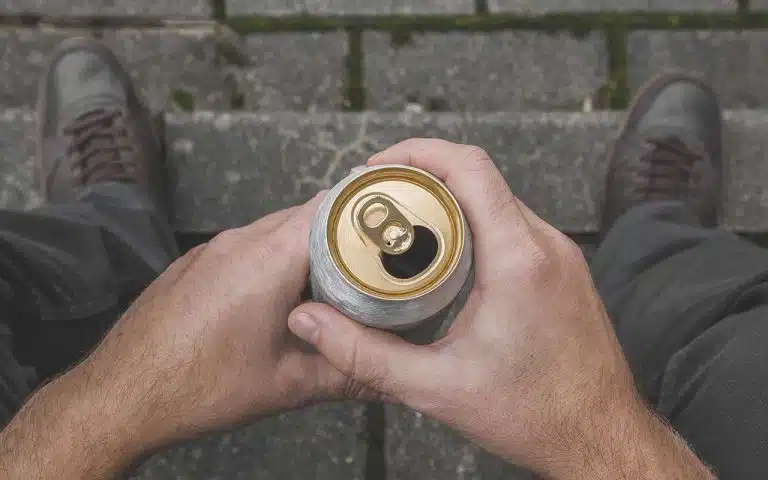Can I Drink Alcohol While In Recovery From Drug Addiction?

An addiction treatment program does everything it can to make your recovery rewarding and successful.
But drug withdrawal and rehabilitation is hard. It’s uncomfortable. It’s volatile. And throwing alcohol into this equation can be much more harmful than you might at first think.
Why You Should NOT Drink Alcohol During Recovery
Could drinking alcohol blunt your withdrawal symptoms and cravings?
Perhaps.
Can drinking also cause a sudden shift from harmful drug abuse to harmful alcohol abuse, prompting you to relapse?
Absolutely.
Alcohol Is A Problematic Substitute
When you’re in the midst of recovery, you may experience some form of acute or lingering withdrawal after detox. Your brain is desperate to feel that rush of dopamine and chemical pleasure that a drug high gives you—and it will take any substitute it can get.
Alcohol intoxication can trip this same chemical reward system, releasing the dopamine you crave and refocusing your problematic behavior and thought processes on a brand-new substance.
It can be easy to forget, but alcohol is a drug. Alcoholism, or alcohol use disorder, is as serious a substance abuse issue as to any other form of dependence or addiction. Total abstinence is a far safer road to walk.
The Risk Of Cross-Addiction
Past addictive behavior, like drug abuse, primes the mind to embrace other addictive substances and behaviors in the future.
And, once you successfully complete rehabilitation following drug abuse, it’s natural to feel an urge to replace drug addiction with something else. Something that can give you the same compulsive outlet for your energy—even if it’s just as harmful.
For some, this new addiction might be gambling. For others it can be compulsive exercise, reckless shopping, gaming, eating disorders, or risky sexual behavior.
Or it can be drinking alcohol, with all the issues and harmful effects that come with it.
This phenomenon is called cross-addiction or addiction transfer, and it’s a major risk that anyone getting clean from drugs should be aware of.
Relapse
Alcohol is a known gateway drug, with early alcohol consumption linked to vastly increased risk of future substance use disorder. So, if alcohol use contributes to the circumstances that cause so many people to start taking drugs—why would alcohol help others get away from it?
It wouldn’t.
Remember, recovery isn’t just the physical process of overcoming withdrawal. Recovery is mental and even spiritual warfare. It requires that you build new focus and determination to refrain from substance use, from day one to day one thousand and beyond.
Alcohol intoxication undercuts that focus, compromises your better judgement, and weakens your inhibitions. Instead of helping relieve your stress and calm your body and mind, alcohol may push you into relapsing, at the cost of so much time, energy, and emotion.
It’s just not worth the risk.
It Hasn’t Worked In The Past
Believe it or not, there have been experimental rehab programs in the past that have attempted to integrate alcohol consumption into support groups and treatment programs.
And these attempts went about as well as you’d expect. Some showed heavily mixed results and others ended as total disasters with devastating outcomes for many of the participants involved.
If alcohol hasn’t been successfully used to treat withdrawal symptoms and stress, even when used by treatment providers in controlled settings, why expect it to help you achieve sobriety during your recovery?
Alcohol Is Not A Healthy Way To Cope
Alcohol use as a coping mechanism during drug treatment can delay your real recovery or lead you right back to substance abuse.
But that’s not the end of the story. Research suggests that recovery from drug use reduces the risk of future drug dependency. Your abstinence and efforts in the recovery process can help you develop the tools, coping skills, and mindset to live a fulfilling life without drugs or alcohol.
Compassionate Substance Abuse Treatment
Taken alone or used together, drugs and alcohol can be addictive and destructive. Fortunately, recovery is possible and professional substance abuse rehabilitation can help.
If you or a loved one struggles with drug addiction, Ark Behavioral Health is here to give you the tools and support you need to make a lifelong change. To explore our personalized addiction treatment options, please contact our team today.
Written by Ark Behavioral Health Editorial Team
©2024 Ark National Holdings, LLC. | All Rights Reserved.
This page does not provide medical advice.
JAMA Psychiatry - Testing the Drug Substitution Switching-Addictions Hypothesis: A Prospective Study in a Nationally Representative Sample
PubMed - Covariation in addictive behaviours: a study of addictive orientations using the Shorter PROMIS Questionnaire
Russian Psychological Society - Social and personal factors of stable remission for people with drug addictions

Questions About Treatment?
Ark Behavioral Health offers 100% confidential substance abuse assessment and treatment placement tailored to your individual needs. Achieve long-term recovery.
100% confidential. We respect your privacy.
Prefer Texting?
Our friendly support team is here to chat 24/7. Opt out any time.







 Learn More
Learn More








